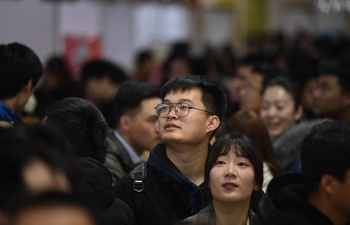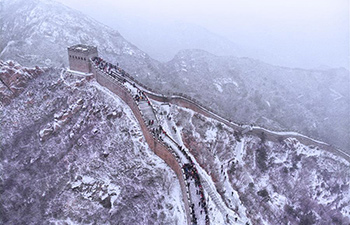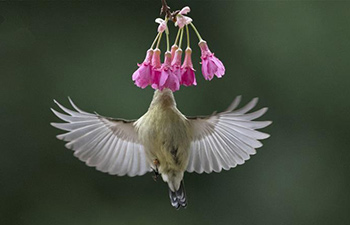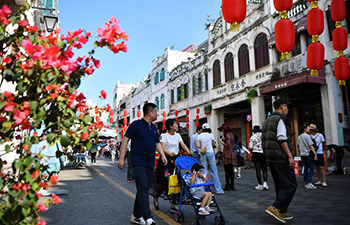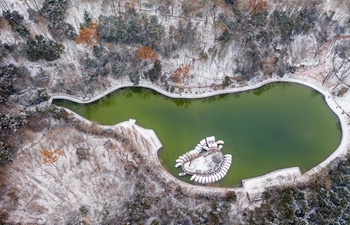
People queue up to buy cheap fruits and vegetables at a tent set by local municipality in Ankara, Turkey, on Feb. 13, 2019. On Monday, sales aiming to curb food prices have begun in Istanbul and Ankara, Turkey's biggest cities, with people queuing to buy a few kilograms of vegetable and fruits at half of the market prices, local press reported. (Xinhua/Mustafa Kaya)
by Burak Akinci
ANKARA, Feb. 14 (Xinhua) -- Ahead of mayoral and municipal elections, Turkish President Recep Tayyip Erdogan has declared war against inflation that risks to jeopardize his ruling party's election bid amid an economic downturn.
The elections scheduled for March 31 are the first since the Turkish leader became the country's first executive president under a new constitution in June 2018, and will be a test on the governance by the president and his ruling Justice and Development Party (AKP) after the economic turbulence.
On Monday, sales aiming to curb food prices have begun in Istanbul and Ankara, Turkey's biggest cities, with people queuing to buy a few kilograms of vegetable and fruits at half of the market prices, local press reported.
This municipal scheme aims to eliminate middleman between producers and customers, an initiative promised by Erdogan to combat troublesome food prices, the main factor of rampant inflation which rose to 20.3 percent in January 2019.
"A game is being played on Turkey. We started to sell cheap fruit and vegetables against those who terrorize food prices," said Erdogan during a campaign rally on Tuesday.
The move will be extended to rice and cleaning products, he added.
Agriculture Minister Bekir Pakdemirli visited a tent set up by the Ankara municipality, saying that the project will continue as long as it is needed and could become permanent.
Erdogan has continued to put pressure on food stores as rising prices are making daily headlines amid a pledge of strict fiscal disciple to shore up market confidence after last year's currency crisis.
"The government has made considerable progress in combatting inflation which is still very high but it seems the worse is now behind," said Enver Erkan, an economist with Istanbul-based GMC forex.
The expert explained soaring food prices are largely caused by adverse weather conditions and storms in southern and eastern Turkey, where the country's fertile cultivation lands are located.
Erkan also underlined the need for "structural reforms" after the elections in order to address the root causes of agricultural problems.
"We have to drain the swamp rather than kill the flies," said Erkan, remarking that last summer's currency turmoil which caused the Turkish lira to depreciate nearly 40 percent in 2018 against dollar increased considerably production costs such as fuel and fertilizers.
Because of social and political reasons, agricultural lands have been shrinking for more than a decade, raising concerns for Turkey which relies on agricultural imports.
Trade Minister Ruhsar Pekcan said on Sunday that they have detected price increases of over 800 percent between purchases from producers and sales to customers, adding that 88 firms were fined.
Last weeks, supermarkets have pulled vegetables from shelves in order to prevent them from police measures after the Turkish leader accused them of price gouging.
A survey of Istanbul's wholesale market hall shows prices of some vegetables increased more than tripling in January alone, according to newspapers.
In a weekly established marketplace in Ankara's residential Cankaya district, consumers are largely grumbling and so are vendors.
"Since last September, prices increased up to 40 percent. This is really unbearable and painful. We have to choose the grocery that we get most in order to be able to cook our meals," said Sabriye Oncu, a 59-year-old pensioner.
